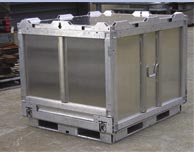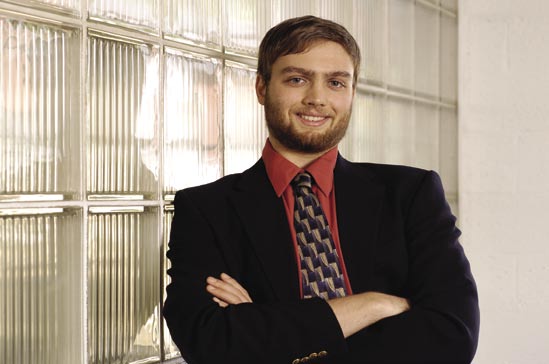The U.S. Navy gives a team of student entrepreneurs the exclusive rights to bring a piece of its military shipping technology to the commercial marketplace.

At the start of his senior year, Ben Gibbs ’05 (A&S) figured that after he graduated, he would work for a financial services company. It was a safe, expected choice for someone with a B.S. in Economics and a minor in Entrepreneurship & Management.
Last fall, all that changed when Gibbs took Technology Commercialization, a class created and taught by Lawrence “Larry” Aronhime ’78 (A&S), ’80 M.A., full-time lecturer in the Whiting School of Engineering’s newly formed Center for Leadership Education (CLE). The course is offered as part of the Center’s W.P. Carey Program in Entrepreneurship & Management. In the course, Aronhime has student teams analyze the commercial viability of specific new technologies from various Johns Hopkins divisions and outside sources.
Gibbs did much more than that. Today, the new graduate is president of Baltimore Shipping Technologies, LLC, the corporation he and three other Hopkins students— all team members in Aronhime’s class—founded in February. Together, they are bringing to the commercial market a modular, reusable shipping container that the U. S. Navy had developed for military use. Gibbs also has been hired as budget analyst with the CLE.
Recalls Aronhime, “When I introduced the project we’d received from the Naval Surface Warfare Center (NSWC) in Indian Head, Maryland, Ben and his team didn’t waste any time.” Aronhime adds, “They did a superior job and the NSWC’s technology transfer office was very impressed.” So impressed that when the students asked for the license to this intellectual property, they got it.
Joining Gibbs in the new company as treasurer is Soren Gandrud ’05 (A&S), an Economics major. The company’s vice president is Thomas Grogan ’05 (A&S), an International Studies major. Andrew Carrera ’06, who is enrolled in the B.S./M.S. Computer Engineering program, also is participating.
“It’s very unusual to give four undergraduates exclusive rights for a piece of technology,” says Aronhime. “How many 22-year-olds have negotiated with the military and military contractors, and are negotiating for technology and sales?”
“We are still flabbergasted,” admits Gibbs. “This is a full-bore immersion into the world of bringing a new technology to the marketplace.” That kind of hands-on, real-world experience is precisely Aronhime’s mission for his course—and the Carey Program. Nearly a decade ago, John C. Wierman founded and developed the program to provide Engineering students with a background in business. Wierman, a Whiting School professor of Applied Mathematics and Statistics, directs the CLE. In 1998 William Polk Carey, a Hopkins trustee and founder and chairman of W.P. Carey & Co., endowed the program with a gift of $2 million. Today, the popular Carey Program, which includes a minor in Entrepreneurship & Management, is one of two experiential learning programs offered through the CLE (see the Winter 2005 Johns Hopkins Engineer).

To find intellectual property for students to evaluate, Aronhime collaborates with Lani Hummel, director of the Whiting School’s Office of Industrial Initiatives. “We have so much intellectual property in Maryland—universities as well as several dozen federal labs,” says Hummel, who enjoys connecting Whiting School faculty to various Hopkins divisions and federal agencies. “It would be great to see more student-created companies in Maryland based on intellectual property coming out of Hopkins, other Maryland-based universities, and federal labs,” she believes.
Hummel and Aronhime were instrumental in helping Gibbs’ company apply for a $75,000 Technology Development Corporation (TEDCO) grant from the state of Maryland, and the two continue to mentor the burgeoning company in identifying additional sources of funding and manufacturing expertise. In August, Gibbs received word from TEDCO that Baltimore Shipping Technologies, LLC, had received the grant. “Ben is one of the youngest entrepreneurs that TEDCO has funded. We’re pleased to provide him and his company with the vital seed funding that will help advance his innovative shipping technology,” said Phillip Singerman, TEDCO’s executive director.
Meanwhile, Gibbs’ company is busy readying its commercial product for the market, which is expected to take two to three years. The firm also is consulting with Charles J. “Chuck” Morton Jr., J.D., a partner at Venable LLP, who teaches the Intellectual Property course in the Carey Program. Gibbs’ company is the first to come out of the three-year-old Technology Commercialization course.
“What’s most rewarding,” says Gibbs, “is that we can walk into a room with people twice our age and vastly more experienced, and they take us seriously. Even if we fall flat on our faces in the next six months, we’ve gained an incredible amount of real-world experience.”

For Aronhime, Hummel, and the Carey Program, that’s the bottom line. “Entrepreneurship is all about taking a chance,” Aronhime explains. “The Tech Commercialization class is as supportive a framework as we can possibly give to the students. What we are providing is inspiration and experience to budding entrepreneurs that they are not going to get anywhere else.”
For more information about Baltimore Shipping Technologies, contact Ben Gibbs at gibbs@baltimoreshippingtech.com.




